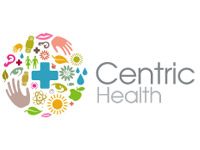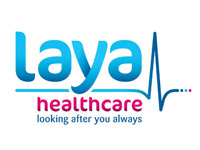Monday: 9:30am – 7:00pm
Tuesday: 9:30am – 7:00pm
Wednesday: 9:30am – 5:00pm
Thursday: 9:30am – 5:00pm
Friday: 9:30am – 5:00pm
Unit 5, Supervalu Shopping Centre, Blanchardtown, Dublin. D15 CDX4
Our Services
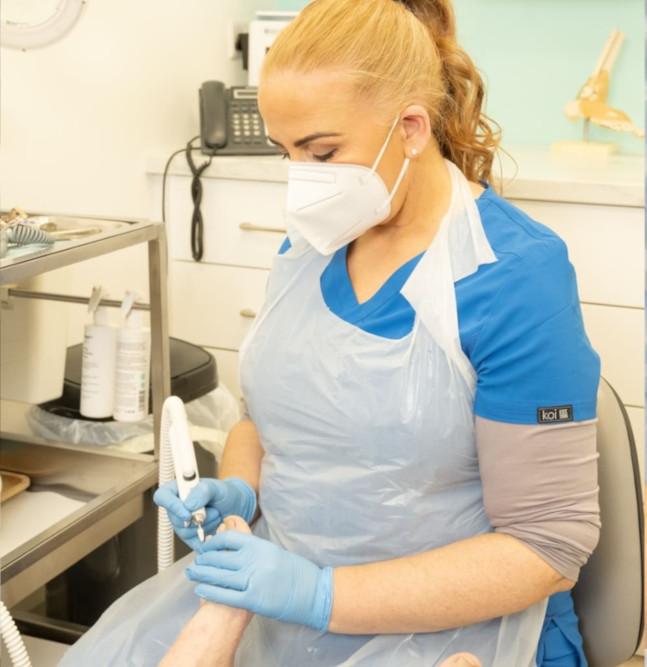
Routine Footcare
Routine Footcare
At Reed Footcare we offer a range of gentle and effective treatments for a range of skin and nail problems. Common treatments covered under our routine treatment include gentle removal of hard skin (callus) and corns with scalpel and filing techniques, mechanical reduction of thick nails, fungal skin treatments and diagnosis of any underlying issues.
Your first appointment will involve taking your medical history, assessing, and discussing your foot health concerns. Once we have all the information we need, we will diagnose any conditions you have and where appropriate provide you with initial treatment as well as giving foot care advice. Please bring a list of any medication being taken.
At the end of your initial consultation we may recommend a follow up appointment, especially if you require ongoing foot care or your condition requires a course of treatment. If subsequent non-routine (special) treatments are advised, such as Lacuna fungal nail treatment, nail reconstruction, or cryotherapy, then this will be discussed with you.
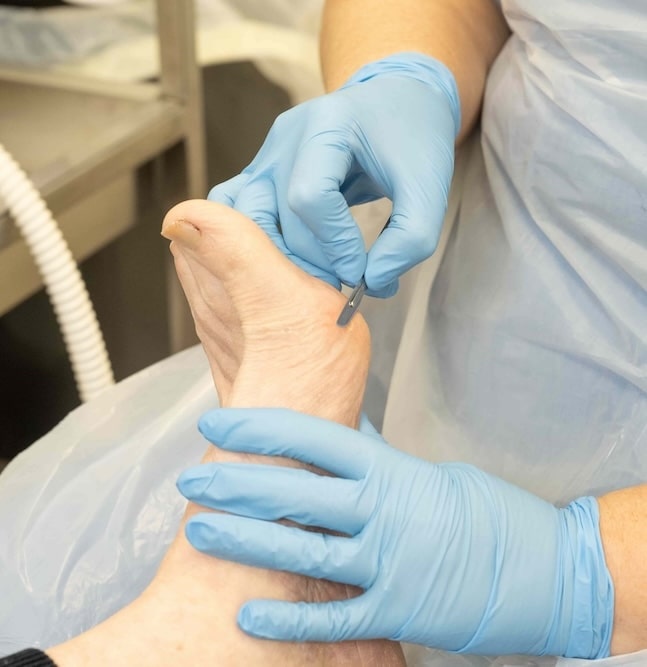
Corns and Callus
Corns and Callus
At Reed Footcare we can give you immediate relief from painful corns and calluses, putting the smile back on your face!
Corns and calluses are concentrated areas of hard skin that build up over weight bearing areas of the feet. These build up on the feet in response to pressure or friction within the footwear. Callus can cause a feeling of burning and discomfort in the feet and usually form over the forefoot, big toe joints and heel areas. Elderly people may have less fatty tissue in their skin, and this can lead to painful callus especially under the ball of the foot.
Corns often develop over joints and between toes and can make you feel like you have a stone in your shoe. Corn and callus removal is performed by expert use of a fine scalpel blade and then the skin may be smoothed with a file. In addition, padding or orthotics may help provide you with extra comfort.
You will be given professional advice on keeping your feet in great condition and staying as pain free as possible. Many people combine regular visits to our clinic with their own foot care at home.
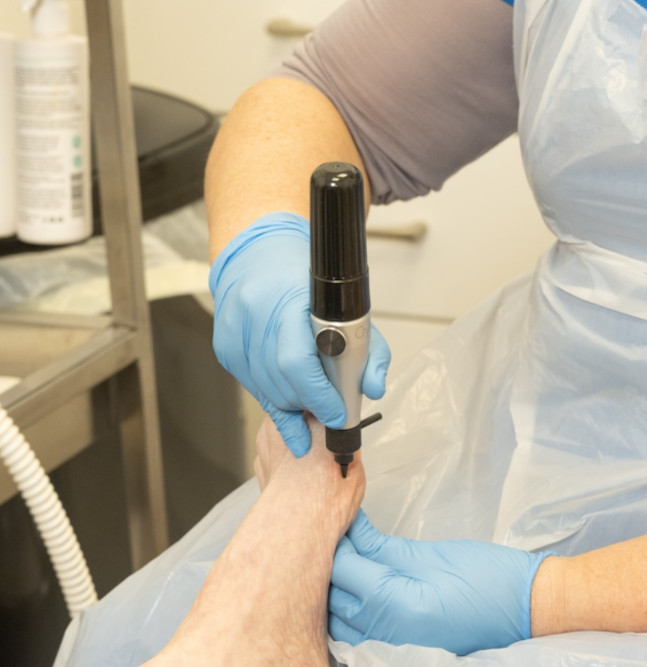
Verrucae Treatment
Verrucae Treatment
At Reed Footcare we know that verrucae treatment can be challenging and its tendency to reoccur can be frustrating for patients. Verrucae can be very resistant to treatment, and there is a range of treatment options available at our clinic. We work with our patients to treat, manage, and successfully eliminate their verrucae infection.
All treatments are aimed at provoking an immune response for your body to get rid of the verruca. These include (after gentle removal of overlying skin); caustic treatments (salicylic acid and silver nitrate) and cryotherapy (freezing) under strict clinic conditions. For caustics and cryotherapy, a programme of treatment, with regular visits, may be needed. Advice is given on what you can do at home to continue treatment between visits.
If the verruca does not hurt, is not growing, or spreading, or is on a young child, you may choose to leave it and allow the body time to fight the virus. Many people simply cover it with a plaster.
Results can vary depending on a range of factors. Some verrucae can resolve without treatment. Many verrucae will resolve with treatment although some may be exceedingly difficult to treat. Eradication of a verruca requires every infected cell to be destroyed. This needs an antibody response via the immune system. The virus is confined to the epidermis and it is thought the immune system does not detect it. Our aim through treatment is to trigger an immune response, and when successful the verruca undergoes a natural deterioration before ultimately disappearing. No verruca treatment is 100% guaranteed.
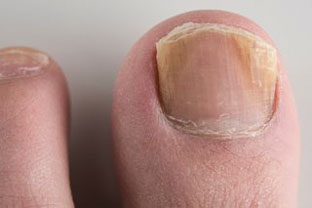
Fungal Nail Infection Management
Fungal Nail Infection Management
Fungal Nail infections are a common problem and at Reed Footcare we understand that many patients want professional help, advice, and treatment. Fungal infection can leave your nails unsightly, cause the deterioration of your nails and can spread to other nails if not treated effectively. Often, fungal nail infections are symptom free. They will only leave the nail slightly discoloured, thickened or brittle. Nail fungus can be difficult to totally resolve but treatment can be attempted to prevent the infection from spreading or causing more nail damage. Early assessment is always advised.
A fungal nail infection can be caused by the same micro-organisms that cause athlete’s foot. Often the discolouration is white, yellow, or brown. Black nails are usually caused by trauma (e.g. stubbing your toe).
Anyone can get a fungal nail infection. They can be a result of nail damage, foot hygiene, occupation, or sports. We work to diagnose and treat your nail infection, bringing your nails back to a healthier condition. Until recently, nail fungus was an embarrassing health problem with limited treatment options, disappointing results, and uncomfortable side effects due to the consumption of oral fungicides.
We offer a range of treatment options including the Lacuna Fungal Nail treatment programme which is the most effective method of fungal nail management available on the market at present. These make tiny holes in the nail plate to allow a topical medicament to be administered by you daily.
There are also treatments by mouth (oral treatments) when you may be prescribed systemic anti-fungal tablets by your GP. This is often the most effective treatment option for more difficult to treat infections. However, these tablets can have some side effects and many patients prefer a topical treatment where possible.
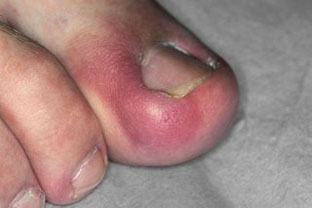
Ingrown Toenail
Ingrown Toenail
At Reed Footcare, we see how much an ingrown toenail can affect your day-to-day activities. Ingrown toenails can be painful and can become a serious health risk if left untreated. The toenail may be painful to touch and may have signs of infection such as swelling, redness, blood, or pus present. An ingrown toenail is a nail that has pierced the skin and can feel a little like a splinter. We remove and treat the source of the infection and give advice on future prevention.
Sometimes seeking professional help and advice with nail cutting is all you need. But for acute, recurrent, or long-term ingrown toenails it is sometimes appropriate to recommend either Nail Bracing or minor nail surgery.
You will be given aftercare advice and follow up treatment to optimise your healing and reduce your risk of developing a further infection. Total time healing will vary, depending on the patient and without minor surgery most ingrown toenails will reoccur.
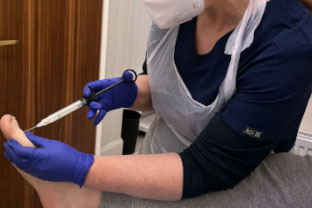
Ingrown Toenail Surgery
Ingrown Toenail Surgery
We offer two different ingrown toenail surgery procedures to help manage ingrown toenails. We can carry out a partial nail avulsion or a total nail avulsion. We will discuss your requirements with you at our consultation and help you decide which procedure is best for you. We carry this procedure out under local anaesthetic at our clinic here in Blanchardstown (usually on Saturdays but we can arrange emergency procedures if required). We can also use a caustic (phenol) which ensures that the nail (full or partial) will not regrow. This procedure is suitable for patients who have infected or recurrent ingrown toenails and is suitable for patients aged 12 and upwards.
Depending on the procedure used, return to work/school is typically within 2-3 days, but a return to sport/other activities takes longer. Recovery from this procedure without phenol is usually two weeks. Recovery with phenol can take up to 10 weeks. The surgery, two post operative appointments and a post-surgery dressings pack are included in the cost. However please note that if more than two post operative appointments are required specific to the nail surgery, there is no extra charge for this.
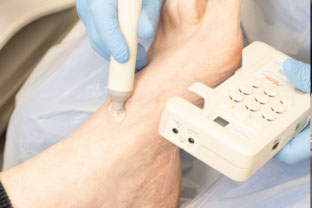
Diabetic Foot-care
Diabetic Foot-care
Assessments typically include:
- Neurological (nerve supply to your feet)
- Vascular (blood supply to your feet)
- Dermatological (skin condition)
- Footwear (suitability for your needs)
- Risk assessment – low, moderate, or high-risk foot
Patients should bring a list of any medication they are currently taking.
Treatment can include:
- advice on how to maintain good foot hygiene
- nail cutting and filing
- moisturiser advice
- removing any callus (hard skin) or corns
- footwear and self-care advice
A specific treatment plan can be agreed depending on your level of risk. An annual Diabetic Foot Assessment is advised, alongside any regular treatment you may require.
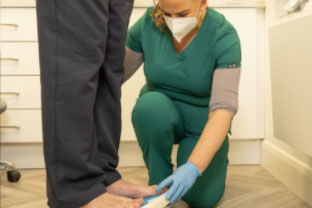
Foot Pain
Foot Pain
At Reed Footcare our goal is to identify the underlying causes of your pain and provide you with effective treatment to get you back to pain free activity. There are a variety of conditions associated with foot pain and we work with you to help improve and manage the condition to avoid further damage. We are delighted to offer our patients an appointment with our Sports Injury and Foot Pain Specialist, Sean Savage.
We work with you to identify the source of the foot pain, the condition to treat and the management of the same. Treatments may be for symptoms including, for example:
- Knee, calf, shin or ankle pain
- Foot pain including heel, arch, or forefoot (ball of foot) pain
- Bunion and lesser toe pain
Conditions treated may include, for example, leg length differences, shin splints (e.g. medial tibial stress syndrome), Achilles tendinopathy, plantar fasciitis, and Morton’s neuroma. Assessment will consider how your foot function and possibly gait (how you walk or run) may be contributing to your symptoms.
The appointment will include taking a thorough history, a lower limb and foot examination and appropriate physical tests including diagnostic ultrasound. Treatment and advice will be given, including recommendations for further investigations if necessary.
Treatment can include prefabricated or custom orthotics/insoles, footwear advice, strengthening and stretching exercises, soft tissue mobilisation and taping.
Please bring or wear loose trousers or shorts.
Please also bring:
- a sample of everyday footwear
- any current orthotics/insoles
- any reports of previous x-rays, scans, or imaging if available (but not essential)

Sports Injuries
Sports Injuries
Sports injuries are a quite common occurrence, and painful feet will hold you back in terms of your health and fitness. Do you ever wonder why you suffer persistent foot, ankle, knee, or hip pain? We carry out a comprehensive analysis to assess your injury and give treatment, advice, and support. At Reed Footcare our goal is to identify the underlying causes of your pain and provide you with effective treatment to get you back to pain free activity. We are delighted to offer our patients an appointment with our Sports Injury and Foot Pain Specialist, Sean Savage.
There are a variety of conditions associated with foot pain and we work with you to help improve and manage the condition to avoid further damage. We work with you to identify the source of the foot pain, the condition to treat and the management of the same. Treatments may be for symptoms including, for example:
- Knee, calf, shin or ankle pain
- Foot pain including heel, arch, or forefoot (ball of foot) pain
- Bunion and lesser toe pain
Conditions treated may include, for example, leg length differences, shin splints (e.g. medial tibial stress syndrome), Achilles tendinopathy, plantar fasciitis, and Morton’s neuroma. Assessment will consider how your foot function and possibly gait (how you walk or run) may be contributing to your symptoms.
The appointment will include taking a thorough history, a lower limb and foot examination and appropriate physical tests including diagnostic ultrasound. Treatment and advice will be given, including recommendations for further investigations if necessary.
Treatment can include prefabricated or custom orthotics/insoles, footwear advice, strengthening and stretching exercises, soft tissue mobilisation and taping.
Please bring or wear loose trousers or shorts.
Please also bring:
- a sample of everyday footwear
- any current orthotics/insoles
- any reports of previous x-rays, scans, or imaging if available (but not essential)
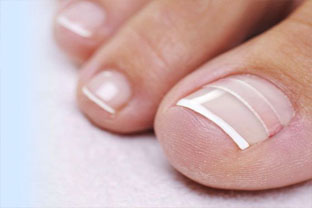
Nail Bracing
Nail Bracing
At Reed Footcare we understand the pain and discomfort caused by ingrown toenails. We work with our patients who have repetitive ingrown toenails to help eliminate the cause of the recurrence by bracing the nail. Nail Bracing is a gentle, non-surgical treatment option for ingrown toenails. This is a completely painless procedure, which may require some follow up visits.
Nail bracing aims to correct the shape of the deformed nail plate, reducing the pain from the pressure on the nail bed and decreasing the formation of any hard skin (callus) that often forms in the nail groove (sulcus) due to the pressure from the nail.
We use the Onyfix nail bracing system. Onyfix is a completely pain free way to treat an ingrown toenail. It involves a composite material applied across the nail, which acts as a “nail brace” to correct the nail’s growth. It is a non-invasive method that supports natural regrowth and reformation of the nail.
The nail brace acts to elevate the nail plate and unload the pressure on the underlying skin and along the nail groove. This allows the underlying skin to regain its strength and accept the pressure of the nail once more. It also elevates the nail on the toe and in some cases, it can totally reduce the involution or inward curving of the toenail.
Nail bracing can be a highly effective alternative for nail surgery, alleviating discomfort quickly and painlessly. As no local anaesthetic is used and no surgery performed, nail bracing is suitable for young children or those preferring not to have surgery. Nail bracing offers a solution for ingrown nails for people with medical conditions that may limit their surgery options, such as those with diabetes.
Although not suitable for all patients, we have had an excellent success rate with patients who consistently have a recurring ingrown toenail but do not want to have the nail fully removed. A careful aftercare plan is formulated with each patient to ensure maximum success of the treatment.
Generally, treatments can take between 3 to 12 months. Follow-up consultations will be required every 10 weeks to check the effectiveness of the brace. Each brace does have a limited life span requiring replacement as clinically indicated.
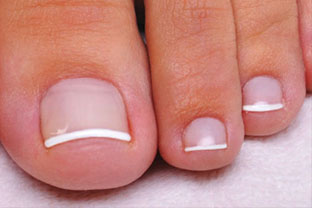
Toenail Reconstruction
Toenail Reconstruction
If you suffer from damaged nails or have lost a partial toenail, then Toenail Reconstruction could be the solution to your cosmetic toenail issues! Toenail Reconstruction is a highly effective toenail correction system that constructs a prosthetic toenail on top of your damaged nail giving the appearance of a normal nail. Unique adhesive properties mean that good results can be achieved even on the most deformed looking nails as it can conceal ridges, discolouration and deformities with results lasting for months.
Toenail Reconstruction acts as an excellent prosthesis after surgery and is ideal for patients requiring a cosmetic solution to a fungal nail to boost your confidence and allow you to wear open footwear without being embarrassed. It can also provide a protective covering for ingrowing toenails or sensitive nails. It looks, acts, and feels exactly like a real toenail!
At Reed Footcare we are the only clinic in Ireland to have four different Toenail Reconstruction solutions available depending on the solution required for the patient, be it cosmetic or medical and we have the ability to match the natural colour of your own nails.
Transform your damaged or fungal toenails today using our toenail reconstruction service which allows you to continue to treat your damaged nails whilst giving the appearance of a normal nail. A quick and pain free procedure, we recommend this treatment if you are particularly conscious of the condition of your nails or if the damaged nail is causing you any discomfort.
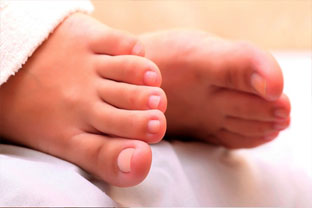
Full Medical Pedicure
Full Medical Pedicure
At Reed Footcare we offer our patients a medical pedicure which includes a thorough inspection of your feet along with a range of gentle and effective treatments to address all aspects of your foot health including hard skin, corns, callus, dry skin, fungal foot infection and ageing foot issues during your appointment.
Common treatments covered under our medical pedicure treatment include gentle removal of hard skin (callus) and corns with scalpel and filing techniques, mechanical reduction of thick nails, fungal skin treatments and diagnosis of any underlying issues.
Your first appointment will involve taking your medical history, assessing, and discussing your foot health concerns. Once we have all the information we need, we will diagnose any conditions you have and where appropriate provide you with initial treatment as well as giving foot care advice. Please bring a list of any medication being taken.
Your feet will look and feel like new as every aspect of the foot is addressed with a firm eye on cosmetic as well as preventive medical concerns along with advice on how to maintain these results at home.
Extremely popular with both men and women alike, you will leave feeling like you are walking on air.
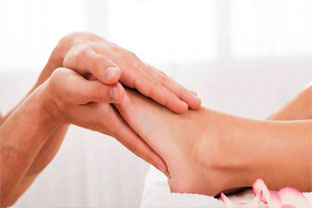
Warm Wax Therapeutic Treatment
Warm Wax Therapeutic Treatment
At Reed Footcare we are delighted to offer this relaxing therapeutic treatment which uses paraffin wax heat therapy to increase the blood flow, tolerance for pain, relax muscles and increase hydration in the skin. Intended to moisturise and soften the skin and aching joints, making it particularly beneficial for those suffering from arthritis and rheumatic pain.
This is truly a pamper session for the feet as we use a foot wash and scrub followed by a foot massage using essential oils before the warm paraffin wax is put on the feet and the feet are placed in warm booties for a time to relax and unwind. The paraffin wax decreases calluses on the feet while deodorising and soothing the skin. The essential oils intensely moisturise and provide antiseptic and anti-inflammatory action.
This is followed by a further foot massage and application of moisturising cream. Intended to moisturise and soften the skin while providing a therapeutic and healing effect which benefits conditions such as poor circulation, chilblains, eczema, and psoriasis.
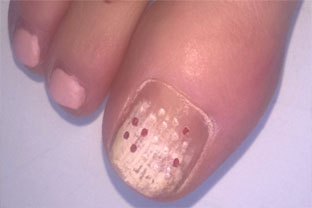
Lacuna Fungal Nail Treatment Programme
Lacuna Fungal Nail Treatment Programme
At Reed Footcare we understand that fungal nails can be frustrating and unsightly, despite your best efforts. The Lacuna method has been clinically proven to be effective in the treatment of fungal nails. Short-term studies have been very encouraging although no treatment can be guaranteed to be 100% successful. We can offer the Lacuna method of treating fungal nails. By introducing micro-holes through the nail plate, an anti-fungal solution can be applied daily and reach the nail bed (the site of infection) directly.
Lacuna is an effective, therapeutic treatment which does not require anaesthesia and treats the fungal infection at source on the nail bed rather than the traditional over the counter antifungal solutions which are painted or applied to the nail plate which fail as they cannot penetrate the nail plate to reach the actual infection is on the skin under the nail (i.e. the nail bed) – not the nail itself.
It is an effective treatment that goes one step further in eliminating Onychomycosis (nail fungus) by micro-drilling treatment followed by administration of a topical medicament daily (at home). The affected nails may be reduced in thickness before the Lacuna method is used. A before and after photo will be taken and a return appointment every 10 weeks are often advised during treatment. We often used a combined therapy of topical and oral antifungal if the infection is significant.
Reed Footcare Clinic is a pioneer of this treatment approach in Ireland and is one of the few clinics carrying out this procedure which has been specifically designed to target and treat fungal nail conditions. We have had huge success with this treatment at our clinic – contact us today to find out more information and see if this is the solution to your fungal nail problems.
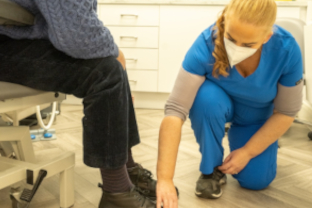
Foot-care Assessment
Foot-care Assessment
Assessments typically include:
- Neurological (nerve supply to your feet)
- Vascular (blood supply to your feet)
- Dermatological (skin condition)
- Footwear (suitability for your needs)
- Risk assessment – low, moderate, or high-risk foot
Patients should bring a list of any medication they are currently taking.
Treatment can include:
- advice on how to maintain good foot hygiene
- nail cutting and filing
- moisturiser advice
- removing any callus (hard skin) or corns
- footwear and self-care advice
A specific treatment plan can be agreed depending on your level of risk. It is important to have the health of your foot assessed to ensure you put the best possible foot forward! We are delighted to assess and offer all our patients’ advice and guidance on foot care, footwear and the ongoing upkeep and maintenance of their feet.
This will form part of your appointment and your aftercare plan where we give you some guidelines to maintain excellent results at home.
Insurance Registered
• Top-notch Expertise: Janette's knowledge and skillset are truly impressive. She's clearly at the top of her game in podiatry.
• Caring and Friendly: The entire team is not only knowledgeable but also incredibly friendly and compassionate. They made me feel comfortable and well-cared for throughout my visits.
Having tried other podiatrists in the past, I can confidently say that Reed Footcare Clinic stands out. If you're looking for the best possible foot care, look no further! I highly recommend booking an appointment with Janette.



